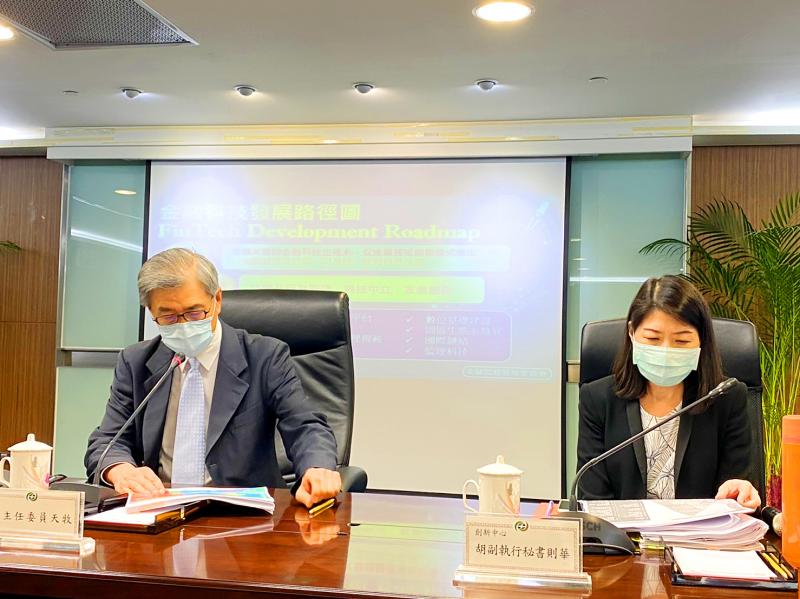The Financial Supervisory Commission (FSC) on Thursday unveiled its fintech development roadmap for the coming three years, relaxing its regulations on consumer data sharing and corporate account opening while introducing a new fintech license.
From next year, financial holding companies’ subsidiaries would be allowed to share consumer data with one another if they have obtained their customers’ consent, Department of Planning Deputy Director Brenda Hu (胡則華) told a news conference in New Taipei City.
This would help companies in assessing risks in doing business with new clients, Hu added.

Photo: Kao Shih-ching, Taipei Times
It would also enable financial holding companies to build bigger databases and risk assessment models for common use by its subsidiaries, which would be more effective and cost-saving than having individual units set up their own databases and models, Hu added.
For example, Cathay Financial Holding Co (國泰金控) could set up a consumer database for its units, such as Cathay Life Insurance Co (國泰人壽) and Cathay United Bank (國泰世華銀行), so the subsidiaries could know their customers better, the commission said.
“However, companies should share consumer data to a reasonable degree and the FSC would implement a new mechanism to ensure that they only share data for the purpose of risk management and not marketing,” Hu said.
While consumer data sharing marks a milestone in the nation’s move into open banking, the commission would leverage the UK’s Financial Conduct Authority experience in promoting such a practice to avoid bad outcomes, such as improper use of consumer data or customer discrimination, the commission said.
The FSC would consider broadening the scope of consumer data sharing to non-affiliated financial firms, such as start-up fintech companies in 2022 or to non-financial companies, such as telecoms and electronic commerce firms, in 2022 or 2023, it said.
Meanwhile, as more businesses are establishing a presence online amid the COVID-19 outbreak, the commission is considering allowing more types of companies to open online corporate bank accounts by 2022.
Currently the commission only allows sole proprietorships or single-shareholder companies to open online corporate accounts to prevent potential disputes.
The commission is considering expanding the measure to include companies with three shareholders or fewer, Banking Bureau Deputy Director-General Lin Chih-chi (林志吉) said.
While the use of corporate seals might seem an unusual custom in many foreign countries, it is still popular in Taiwan and some Asian countries, but if more companies are allowed to open online accounts, they might become redundant, Lin said.
The commission would study the issue further and would relax its regulations on corporate online accounts by phases, Lin said.
Given a lack of fintech talent in Taiwan, the commission would introduce a new fintech license by 2022, rewarding companies that have more licensed fintech staff by prioritizing their applications to conduct fintech businesses, Hu said.
“Some talent in the technology field are interested in changing careers and transferring to the financial industry, but they do not know how to do that. If they pass the exam and obtain a license, it could be their ticket” to the finance industry, Hu said.
What topics should be included in the fintech license exam has not been finalized, she added.

CHIP WAR: Tariffs on Taiwanese chips would prompt companies to move their factories, but not necessarily to the US, unleashing a ‘global cross-sector tariff war’ US President Donald Trump would “shoot himself in the foot” if he follows through on his recent pledge to impose higher tariffs on Taiwanese and other foreign semiconductors entering the US, analysts said. Trump’s plans to raise tariffs on chips manufactured in Taiwan to as high as 100 percent would backfire, macroeconomist Henry Wu (吳嘉隆) said. He would “shoot himself in the foot,” Wu said on Saturday, as such economic measures would lead Taiwanese chip suppliers to pass on additional costs to their US clients and consumers, and ultimately cause another wave of inflation. Trump has claimed that Taiwan took up to

A start-up in Mexico is trying to help get a handle on one coastal city’s plastic waste problem by converting it into gasoline, diesel and other fuels. With less than 10 percent of the world’s plastics being recycled, Petgas’ idea is that rather than letting discarded plastic become waste, it can become productive again as fuel. Petgas developed a machine in the port city of Boca del Rio that uses pyrolysis, a thermodynamic process that heats plastics in the absence of oxygen, breaking it down to produce gasoline, diesel, kerosene, paraffin and coke. Petgas chief technology officer Carlos Parraguirre Diaz said that in

SUPPORT: The government said it would help firms deal with supply disruptions, after Trump signed orders imposing tariffs of 25 percent on imports from Canada and Mexico The government pledged to help companies with operations in Mexico, such as iPhone assembler Hon Hai Precision Industry Co (鴻海精密), also known as Foxconn Technology Group (富士康科技集團), shift production lines and investment if needed to deal with higher US tariffs. The Ministry of Economic Affairs yesterday announced measures to help local firms cope with the US tariff increases on Canada, Mexico, China and other potential areas. The ministry said that it would establish an investment and trade service center in the US to help Taiwanese firms assess the investment environment in different US states, plan supply chain relocation strategies and

Japan intends to closely monitor the impact on its currency of US President Donald Trump’s new tariffs and is worried about the international fallout from the trade imposts, Japanese Minister of Finance Katsunobu Kato said. “We need to carefully see how the exchange rate and other factors will be affected and what form US monetary policy will take in the future,” Kato said yesterday in an interview with Fuji Television. Japan is very concerned about how the tariffs might impact the global economy, he added. Kato spoke as nations and firms brace for potential repercussions after Trump unleashed the first salvo of